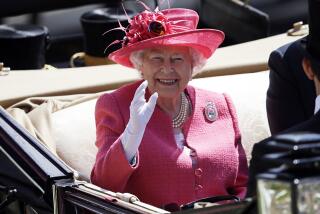Thinking Thatcher as Bush Begins
At the beginning of Tom Clancy’s best-selling “Patriot Games,” the American hero picks up a copy of The Economist from a London news agent. A bit of local color for many American readers, the purchase is for others a coded signal; the literary equivalent of a Masonic handshake or a wink in a singles bar.
More copies of this British news weekly are sold in America than in Britain itself. As Time and Newsweek have moved down market, The Economist has replaced them as the serious reader’s guide to the news. So in a decade when the Pacific Century has threatened to break out almost daily, it is an Atlantic publication, launched in the 19th Century, that has won unprecedented influence in future-obsessed America. Why?
The short answer is Margaret Thatcher. It is no accident that the rise of The Economist has paralleled her apotheosis to the status of political superstar among the world’s English-speaking peoples. The Economist has been the post-courier of her revolution.
This revolutionary postman has, however, a problem. In seeking to court conservative American business opinion, Economist editors have felt compelled to celebrate not only the robust achievements of the “Iron Lady,” but also the less substantial pageant that has been Ronald Reagan’s royal progress during the last eight years. The result has been a recurrence of what might be called our 1776 problem.
That year, as conservative commentators never tire of repeating, saw not only the birth of the American Republic but also the publication of Adam Smith’s “The Wealth of Nations.” Two centuries on, however, what the Invisible Hand seems to have awarded the City on a Hill is a Toyota in every garage. And with the triumph of Japan has come the suspicion that the true prophet of 1776 was not Adam Smith but Edward Gibbon, who published, in that year, the first volume of “The Decline and Fall of the Roman Empire.”
Between them, Smith and Gibbon define the contemporary American political arena. In the blue corner, we have the Smithians: the freshly inaugurated George Bush and his “lip-reading” practitioners of laissez - faire. In the pink corner, there are the Gibbonians: Michael Dukakis, Lloyd Bentsen and Richard Gephardt, all rank with fear for the nation’s relative economic decline.
In his later years, Gibbon confessed that “the names of Pitt and Fox became less interesting to me than those of Caesar and Pompey”; but if asked to brood on the current state of the American empire, I think that the great English historian would caution Americans, and particularly our new President, with the memory of Diocletian: the Roman social conservative who temporarily turned back the forces of imperial decline by reforms that in the end only accelerated the process.
Enter Thatcher. As two recent works of political analysis have made clear, the present British prime minister, now a decade in power, is no great communicator. She describes herself as “a doer, not a talker.”
What this doer has done is reverse a half century of British economic decline. After a decade of Thatcherism, the specter of 17th-Century Spanish retreat is no longer invoked against Britain. Instead, after eight years of Reaganism, it is being nosed at us. The thoughtful conservative has some explaining to do.
Doers or talkers. Like wets versus drys, it is the kind of distinction that Thatcher revels in. It draws blood. It suggests that the most important ideological distinction of the late 1980s is not between conservatives and their opponents, but between types of conservative: rhetorical, all-the-world-is-a-stage media conservatives versus the meat-eaters, the people who get things done. There is no question to which camp Thatcher belongs.
The issue is one of both style and conviction. Two vignettes from Kenneth Harris’ superb political biography “Thatcher” (Little, Brown) make the point.
“At meetings,” he writes, “of the traditionally powerful Tory back-bench 1922 Committee, MPs have normally remained seated when a male leader of the Party has entered the room to address them. The first time Thatcher entered the room as leader, everybody rose. According to one observer, “She made a procession to her seat, as though she expected them to remain upstanding and when she got there turned as though to say, ‘Please be seated.’ It was not many months after this that Norman St John-Stevas invented the title of ‘Leaderene’ for her.”
Of her no-nonsense approach to foreign affairs, Harris observes, “Mrs. Thatcher was strictly utilitarian in these matters. If the niceties of diplomatic convention did not yield results, then there was no reason to observe them. On a later occasion, she was to say to the author (Harris), of her negotiations with the EEC (European Economic Community), ‘I know nothing about diplomacy, but I just know and believe that I want certain things for Britain.’ ”
Harris’ biography provides a tightly written blow-by-blow account of how Thatcher first kidnaped the Tory party, and then stormed that central citadel of British government, the Cabinet itself.
In “Mrs. Thatcher’s Revolution: The Ending of the Socialist Era” (Harvard University Press), Peter Jenkins, the distinguished British commentator, sets out the larger picture, describing with verve and wit the clash of social and political forces that decided whether Britain would surrender to a Venetian twilight of civilized decay or fire up its engine of Victorian progress in preparation for the 21st Century.
His picture of Thatcher herself is one of the most perceptive in the language. One snapshot: “She did not need to read books by Milton Friedman or Friedrich von Hayek to learn the importance of sound money or that the power of the state was the enemy of freedom. She had learned these self-evident truths at her father’s knee.” Sound money indeed: While the yen replaces the dollar as the strongest currency in the United States, Thatcher’s Britain has actually started repaying its national debt.
On the relationship between the British prime minister and Ronald Reagan, Jenkins is both fair and candid: “She admired Reagan for his immense talent as a persuader and she was fond of him as a man. . . . Nevertheless, she knew perfectly well that she wouldn’t have tolerated him in her own Cabinet for a moment. ‘Poor dear, there’s nothing between his ears,’ she once said to one of her officials.”
Lest liberals derive too much from such remarks, Jenkins’ dissection of the current predicament of the British Labour Party will make sober reading for any backer of Michael Dukakis. For the skeptic who feels that Jenkins and Harris have given Thatcher too easy a ride, let me recommend Prof. David Marquand’s elegant critique of Thatcherism called “The Unprincipled Society” (Fontana). The point of all this, however, is not a final judgment on Thatcher but rather the continuing fecundity of the British example.
The cardinal move in all political reflection is comparison. Just now we are taking stock of our national experiment with conservatism, as the British are theirs. The writings of Harris and Jenkins allow us to eavesdrop on their musings, and the result is a reading experience rather more bracing than the latest East European novel, much less the latest discourse on Japanese business philosophy.
I would be bolder still and argue that if we Americans are serious about thinking through the difficulties of our current political and social circumstance (penser la situation, the French would say), then no society is more relevant to this meditation--not even Japan itself--than Britain is today.
More to Read
Sign up for our Book Club newsletter
Get the latest news, events and more from the Los Angeles Times Book Club, and help us get L.A. reading and talking.
You may occasionally receive promotional content from the Los Angeles Times.









